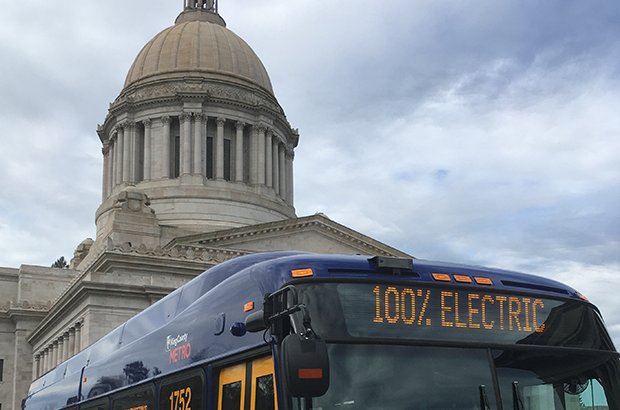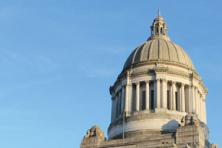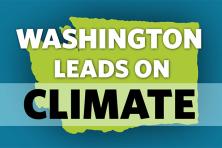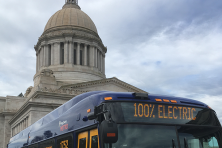PDFs for quick reference:
- one-page summary of our 2021 priorities in Washington.
- summary of Healthy Homes, Clean Buildings (HB 1084)
- Healthy Homes, Clean Buildings FAQ
- Why WA needs Clean Fuels Now
- Why a Clean Fuel Standard?
- Clean Fuels FAQ
- Costs and Clean Fuels
- Debunking oil industry misinformation
In Washington, we’ve made significant progress in cutting climate pollution; our state is among those leading through commitments to achieve 100% clean electricity.
In 2020, while the Washington State Legislature strengthened goals for how much pollution we still need to cut with the passage of HB 2311, they didn't do nearly enough to actually achieve these goals and fight climate change.
We can still make the choice to lead nationally, and make significant progress on cleaning up our largest and fastest-growing sources of pollution—transportation and buildings. But every year counts when it comes to climate action. With insufficient progress in 2020, this year’s Legislature must double down on climate action if we are to meet the challenge.
2021 poses a unique opportunity not only to address climate change, but also to tackle long-term systemic racism and the public health crises that are disproportionately impacting people of color across the nation. We can invest in a clean and just recovery by transitioning to a clean energy economy that puts people, health, and our climate first and continues to demonstrate our state’s strength and leadership in the region. While the smoke from 2020’s Labor Day fires seems distant during these rainy months, it was a stark reminder of the havoc climate change is wreaking on human health and landscapes across our state.
Below is an outline of our climate action priorities for 2021; this is where we will focus our efforts during Washington’s 2021 legislative session beginning on January 11.
It’s Time to Do Something about Transportation Pollution
The shutdown due to COVID-19 brought much of our transportation to a standstill—at the same time giving us, temporarily at least, the experience of clearer skies and cleaner air than we normally enjoy. We don’t want to sacrifice our economy to gain and protect cleaner air—but with the right policy changes, we don’t have to.
As we reemerge from pandemic lockdown, we must do so by cleaning up the pollution caused by transportation, pollution which is responsible for a range of serious health impacts that affect us all, but cause disproportionate harm for low-income communities and especially communities of color. Cleaning up transportation pollution means electrifying just about all we can; moving to clean-burning, sustainably produced liquid fuels for the other vehicles that cannot go electric during the transition; and focusing our transportation investments and funding to be progressive, sustainable, affordable and accessible for everyone. New research from Climate Solutions shows that the optimal case for transportation decarbonization involves both electrification of nearly all vehicles on the road and reducing the need for vehicles through transit expansion and efficient land use policy—while giving us more ways to get around more efficiently in our communities. The best part? This optimal case will reduce annual transportation spending by households by over $4,000 per year.
What can the Legislature do now?
Finally Pass a Clean Fuel Standard (HB 1091)
In 2021, the people should finally see the success of multi-year efforts to pass a Clean Fuel Standard, with HB 1091. In addition to being a key climate priority for Governor Inslee, cleaner transportation fuels have strong and very diverse support across Washington, supported by fully two thirds of the public. A Clean Fuel Standard simply requires fuel producers to sell a cleaner product or to invest in clean, low-carbon choices like electricity and sustainable biofuels to power our transportation. It means clean choices at the pump including electricity, cleaning up pollution from cars and trucks, and creating more local jobs.
Leading public health organizations such as the American Lung Association and the Washington State Medical Association view cleaner fuels as one of the most important ways to improve air quality and reduce healthcare costs. Prioritizing clean air will also begin to address long-standing inequities for communities of color and lower income communities who are most impacted by pollution—too often living and working in proximity to more fossil fuel pollution. Additionally, these communities will directly benefit from revenue generated from the clean fuels program through targeted investments.
Washington is already home to clean fuels producers, but they ship their products out of state to neighbors that have adopted clean fuel standards: California, Oregon and British Columbia. These jurisdictions continue to attract new clean fuels business investments, such as sustainable biofuel feedstock production in rural communities and electric vehicle infrastructure. Washington already supports over 1,900 jobs in the clean fuels industry and over 3,000 jobs in the electric vehicle industry; by relying on local fuels rather than out-of-state oil, we can grow our clean energy job market. The House passed a Clean Fuel Standard in each of the last two legislative sessions, but the Senate failed to act each time. This year the Legislature should deliver on this necessary, unfinished business rather than bending once again to oil industry pressure and misinformation.
Learn more about the Clean Fuel Standard here or by visiting cleanfuelswork.com.
Transform Transportation Funding & Investments
Washington must adequately fund transportation options, including transit. But the state is short on funding, especially after the economically difficult year of 2020. New sources of transportation revenue should be progressive, climate-forward, and flexible in how they can be spent, and should move us away from a reliance on fossil fuels for primary revenues.
What about Buildings?
Our built environment is a major contributor to global warming, and emissions are growing at a faster rate than any source of carbon pollution in Washington State. In our recent blog series on clean buildings, we discuss and demonstrate the climate, health, and economics case for prioritizing reducing fossil fuel use in our buildings and increasing accessing and growth in all-electric buildings across the state.
Reducing this pollution can start with how we construct new buildings; there are already efforts underway for 2021 to make it easier to build all-electric homes, schools, libraries, workplaces, and commercial spaces. Governor Inslee’s recent climate priorities announcement proposed ways to expand these efforts, and local governments in Bellingham, Seattle, and Thurston County are part of a national trend of cities ready to ensure that new construction is all-electric. Washington State’s recent Statewide Energy Strategy showed that the lowest-cost pathway for achieving the state’s climate goals by 2050 relies on electrifying our buildings. Washington needs policies to move towards 100% clean, all-electric buildings that will keep residents safe and healthy.
Electrify Home Heating
The buildings legislation proposed by the governor and championed by Representative Ramel and Senator Liias will ensure not only that new buildings are powered by healthy 100% clean electricity, but that consumers that want to shift to clean energy will have support from their utilities. A successful home heating electrification plan will make clear that public utilities have the authority to develop and demonstrate a business case for building electrification programs. Currently, a resident that relies on a non-electric energy source, such as wood stoves, heating oil, or a gas furnace, is ineligible to receive incentives from their public electric utility to upgrade to clean, electric appliances. Instead, these incentives to upgrade are only available to customers that already use electric appliances.
Accelerating the conversion of our buildings to all-electric energy will benefit low-income customers transitioning too, because state law already requires electric utilities to provide low-income assistance—a requirement that gas utilities don't have to follow. This will ensure a more equitable energy landscape. The Washington Legislature should clarify that public utilities have the authority to develop and demonstrate a business case for electrification programs.
Stop Legislating Preferences for Fracked Gas
Washington State’s code currently creates preferences for fossil gas through language that declares it is the policy of the state to “preserve affordable natural gas,” and classifies natural gas as a “clean energy source.” Changing these references to language that prioritizes affordable and truly clean energy over gas will refocus the state’s priorities on clean sources of energy like wind and solar while preserving affordability as a key goal of state policy, regardless of which energy choice a Washington resident relies on. In addition, removing tax preferences for fracked gas will save the state much-needed money.
Consider Climate When Planning for Growth
The issues of climate change, environmental justice and housing affordability are having profound impacts in Washington. However, our state’s Growth Management Act (GMA) currently addresses neither climate nor environmental justice, and could be strengthened with regard to housing affordability. The Legislature should update the GMA to address these challenges and ensure that our long-range planning leads to reduced pollution, more resilient communities, and affordable places to live. It is important to update the law now, before cities and counties embark on updating their next comprehensive plans, investments and expansion.
What about economy-wide reductions?
In addition to cutting pollution from vehicles and buildings, the Washington Legislature must also focus on emissions standards, investment in clean energy solutions, and social and economic justice. We need progress in each of these areas in order to address the challenges before us at the speed and scale required to achieve a stable climate and a green recovery for all.
Account for the Cost of Carbon Pollution
Carbon pricing captures the cost of greenhouse gas pollution and ties it to its sources, both disincentivizing fossil fuel use and creating revenue to reinvest in healthy communities and renewable energy. Revenue generated from carbon pricing can and should be invested in cutting greenhouse gas pollution, and to mitigate the impacts of polluting industries on BIPOC (Black, Indigenous, and People of Color) and low-income communities.
As legislators consider pricing measures this year, they must also pass several complementary climate policies. Our state is not currently on track to meet our goals. Reducing carbon pollution via a price alone is difficult; carbon pricing is most effective when revenues are reinvested in further emissions reductions. That’s why we need to respond to the climate crisis with a range of effective policies at the same time. Well-designed carbon pricing systems can be effective tools, but they are a complement, not a replacement, for a Clean Fuel Standard. In California and British Columbia, clean fuel standards operate alongside pricing systems which target large, stationary emitters and petroleum distributors, while the clean fuel standards cover emissions from the transportation sector. We need a Clean Fuel Standard to truly cut carbon in the transportation sector, protect our health, and support local clean fuel production.
Learn more about different pricing models and how these policies can work for all communities with our Climate Leaders Live Carbon Pricing 101 webinar.
Build a Resilient Future
The simultaneous crises our state now faces—including a public health emergency, an economic catastrophe, a climate crisis, and a reckoning with our nation’s racist history—are deeply intertwined and call for bold solutions. The Resilient Future platform, supported by a broad statewide coalition, details the steps we must take to set our state on a path towards a just, climate resilient future. These include passing the environmental justice-focused Healthy Environment for All (HEAL) Act, investing in clean transportation, providing immediate and long-term relief for communities hit hardest by the current crises, and ensuring that future land use planning takes into account climate change, affordable housing, and environmental justice.
Read the entire Resilient Future platform at the Climate Alliance for Jobs and Clean Energy.
Buy Clean, Buy Fair
Buy Clean policies, such as the policy passed in California in 2017, mandate that emissions from certain materials be documented and considered when contracting for state-funded infrastructure projects. Adding a Buy Fair element requires contractors and subcontractors to report on domestic labor law compliance in the countries where they produce goods and services, incentivizing clean and fair manufacturing. In 2021, advocates will prioritize a bill that requires disclosure of embodied carbon and labor practices to ensure to help the state understand its procurement practices, and consider requirements in future sessions. Buy Clean, Buy Fair encourages contractors to produce and purchase goods from responsible manufacturers who have good labor practices and would harness the state’s purchasing power to cut hidden, embodied carbon.
What can you do?
This year has taught us many lessons, pulling us hard into understanding the challenges we face more clearly, through our shared experiences of tragedy. The COVID pandemic remains a crisis; its economic effects are another crisis for many. We are weathering and responding to those crises together. We must do the same with the climate crisis, which if anything is even more profound and present than these other challenges. And we know how to respond to the climate crisis—we have a window of opportunity to avoid the worst harms threatening us by demanding fast, effective action to reduce pollution. We must take advantage of the window we have; at this point, climate delay is essentially the same as climate denial; we have no more time to kick the can down the road.
Your voice matters more than ever. In an all-virtual legislative session, it’s all the more essential for legislators to hear from you early. Can you contact them today?




